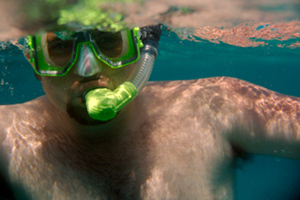GREATER awareness of the risks associated with snorkelling could help to prevent a small but increasing number of snorkelling-related deaths, according to research published in this week’s MJA. (1)
The researchers identified 140 deaths associated with snorkelling between 1994 and 2006.
“Whereas both the absolute numbers and the rates of all reported drowning deaths have fallen over the past two decades, the absolute numbers of reported snorkelling-related deaths have increased,” the researchers wrote. Between 1987 and 1996, there were 60 deaths associated with snorkelling. (2)
Study co-author Professor John Pearn, professor of paediatrics at Brisbane’s Royal Children’s Hospital and national medical advisor for the Royal Life Saving Society, told MJA InSight that snorkelling remained a very safe pastime, noting that the deaths occurred against an unknown, but very large, exposure denominator. More than two million snorkelling activities were recorded on Queensland’s Great Barrier Reef in 2006 alone.
However, Professor Pearn said 140 deaths was a significant number, and classifying the causes might help to reduce the number of deaths.
The research identified four cause-of-death categories — deaths from cardiac or suspected cardiac causes (60); deaths from surface drowning, which occurred largely in inexperienced snorkellers (33); deaths from drowning after prolonged breath-hold diving, which occurred largely in experienced snorkellers (19); and deaths from trauma (10). Eight people died of other causes and forensic pathology details were unavailable in 10 cases.
WA cardiologist Associate Professor Paul Langton said a shift in demographics meant older people were participating in activities that 20–30 years ago attracted predominantly young, fit people.
“As the population is ageing, we’re seeing that older people are more likely to participate in activities like scuba diving, snorkelling and spear fishing”, he said. “They can be great fun experiences, but they can also be lethal.”
The MJA study found that the people who died of cardiac causes were typically males who had been previously well, with a median age of 65 years.
“That’s the demographic of people trying snorkelling for the first time, often as a one-off, rather than starting out as a regular hobby”, Professor Langton said.
“There’s actually quite a high physical demand to kicking a long a set of fins. If you haven’t done it before and are unaccustomed to vigorous exercise, then … that’s a great way of precipitating a heart attack”, he said.
“People should be aware of the potential and have a degree of swimming fitness before they take these things on.”
Professor Pearn said it was often wise for patients to have a medical check before snorkelling. “Anybody who is going to a tropical or subtropical destination where they are likely to go snorkelling, especially if that’s going to be a novel experience, would be wise to have a standard medical check. Of course, in most cases, it would result in them being able to snorkel with confidence.”
He said medical assessment was particularly important for patients with a family history of sudden, unexplained death in a younger member of their extended family (up to third-degree relatives).
The researchers found that at least a quarter of the drowning deaths (19) were in highly experienced divers who had held their breath for extended periods.
Professor Pearn said extended breath-holding had long been recognised as dangerous and he hoped that highlighting the 19 preventable deaths from this cause would help to discourage the practice.
– Nicole Mackee
1. MJA 2012; 197: 230-232
2. MJA 1999; 171: 591-594
Posted 20 August 2012

 more_vert
more_vert
Some snorkels are made in an inappropriate size and shape that leads to CO2 retention within the snorkel. This can lead to unconsciousness.